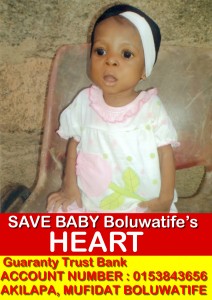by Olayinka Egbokhare
I met Mufidat Boluwatife and her mother, Mrs. Akilapa, for the first time, at University College Hospital (UCH), Ibadan, in January 2014. Lase, my daughter, had just started attending the clinic at CHOP (Children’s Out Patient Clinic). Mrs Akilapa had the baby strapped to the back when she arrived. We exchanged pleasantries. After a few minutes, she brought the baby down. Before we parted ways that day, I already knew so much about her.
This was her first child, Mufidat. The baby had “holes in the heart” and would require surgery. She talked about their frequent hospital admissions and told me of one or two mothers whose babies had passed on. She spoke of how she no longer plied her trade and how she had stopped attending social functions because she could not keep up with the questions about how her baby was not developing well. She told me of the comment made by the woman whom she usually bought diapers from who asked how come her baby still used the same size of diapers she had been using since birth.
Little did I know that this would be the beginning of a friendship whose attraction will be tied to shared pain and hope.
 I spoke with Mrs Akilapa this morning, July 10, 2014. It has been 10 days after Lase, my daughter, passed on and I was yet to receive my friend’s condolences. I knew she was aware my baby had gone to rest and today as I scrambled for some comfort and hope from those who could feel my pain, I called her. She apologised profusely for not calling. She said she could not bear to talk to me and did not know what to say to me. I have heard this line a lot these past few days, not only from some of my young students but also from some adults. “I don’t know what to say to you”.
I spoke with Mrs Akilapa this morning, July 10, 2014. It has been 10 days after Lase, my daughter, passed on and I was yet to receive my friend’s condolences. I knew she was aware my baby had gone to rest and today as I scrambled for some comfort and hope from those who could feel my pain, I called her. She apologised profusely for not calling. She said she could not bear to talk to me and did not know what to say to me. I have heard this line a lot these past few days, not only from some of my young students but also from some adults. “I don’t know what to say to you”.
Many of us really don’t know how to handle grief. What did I also ever say to people in this situation? Some trite cliché, I am sure. Now I fully understand what loss means and how it feels. It is an empty, strange, utterly sore, caged-in feeling.
Mrs Akilapa told me Mufidat is still receiving oxygen. We found her on oxygen when Lase was admitted on June 29th. She must have been on oxygen for about two weeks now. Her mum asked the doctors to take her off oxygen but they reminded her of how she passed out the last time her oxygen finished and there was no money to refill the cylinder. I now know the emptiness of not being able to hold your baby because she has ceased to be. My husband and I would have given all we have and even borrowed more if only Lase’s case had required corrective surgery.
But Mufidat’s case is redeemable. If we all give something, she will get the required corrective cardiac surgery and live. The operation will cost about 2.5 million naira (about $15,500). Is it something we can raise? I believe so. Rather than merely mourn a loss, I realize how important it is to also do something substantial to help those still holding on to hope and possibility. If we raise sufficient funds, Mufidat Boluwatife can heal and grow up to fulfill her life’s dreams.
Will you partner with us on this urgent fundraising bid? Do you have the heart to help? God will grant Mufidat a new heart and a new lease of life. Did I hear you say Amen? Then act now.
Information about how to send money to Mrs. Akilapa towards the surgery for her baby can be found on the photo above. More information is also available on this Facebook page created for this purpose. Donate generously. Save this heart!
__________________
Olayinka Egbokhare (PhD) is a writer, and lecturer in the Department of Communications and Language Arts, University of Ibadan, Nigeria. Her novel Dazzling Mirage, a story about sickle cell anemia, was recently adapted into a movie of the same name by Mainframe Productions.
__________________
Editor’s note: Anyone willing to do anything to help from outside Nigeria can also contact the blogger at kt@ktravula.com
2 Comments to Save this Heart! so far. (RSS Feeds for comments in this post)